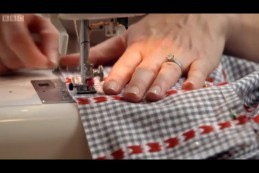For pop and rock music enthusiasts, Thursday evenings in the 1980s were synonymous with Top of The Pops (BBC1, 1964-2006). However, in a parallel universe catering to those with an affinity for Indian music, particularly film songs, a singular offering existed – Nai Zindagi Naya Jeevan (BBC1, 1968-1982). Despite its early Sunday morning time slot, this programme was a must-watch for nearly all British Asians, offering a distinct blend of music and cultural insights that resonated deeply with its dedicated audience.

Fig. 1: Nai Zindagi Naya Jeevan in the broadcast schedule. Source: https://brokentv.uk/2022/07/27/bbc100-the-100-most-broadcast-bbc-programmes-of-all-time-90-86/
Nai Zindagi Naya Jeevan, although not primarily a music programme, drew its audience early with the promise of a musical segment at the end of each episode. The show defied neat categorisation but could be loosely described as a three-part magazine programme. Presented in Hindi, Urdu, or Hindustani, a combination of the two languages, it typically began with current affairs, focusing on issues relevant to the Indian sub-continent, allowing the audience a brief connection to news from their homeland. The second segment addressed topical issues faced by Asians living in Britain as they adapted to a new way of life, a theme echoed in Asian Dub Foundation’s track, New Way, New Life: ‘Every Sunday morning in front of the TV. Recording with a microphone Naya Zindagi’ (Das et al., 2000). The presenters also provided information, advice, guidance, and weekly community notices, promoting awareness of various groups and societies. In this way, the programme exemplified the core principles of public service broadcasting by catering to the specific needs and concerns of the Asian community in Britain. However, for many viewers, these segments were akin to a support act, patiently endured in anticipation of the main event—the song that followed.
The song could take many forms, and occasionally, there would be a special edition where the entire programme was devoted to a single guest musician. One memorable television event featured a performance by Lata Mangeshkar, one of the most successful ‘playback’ singers in Indian cinema. The ‘playback’ method, introduced in the 1930s, involves an artist recording a song, and then the track is taken to set and ‘played back’ while the actor mimes the words (Kabir, 2001). Typically, a short segment at the end of Nai Zindagi Naya Jeevan, either a live performance or a film song, was enough to tide the audience over until the following week.
With the prevalence of satellite dishes, streaming services, and the internet, it is difficult to remember a time when watching a clip or a song from an Indian film, particularly on British television, was non-existent. Based on my current research, Nai Zindagi Naya Jeevan provided the only opportunity for British Asians to access Indian cinema on terrestrial television. This programme was significant for many reasons. Primarily, it offered British Asian audiences, especially the first and older second generations, a rare opportunity to see and hear themselves without being othered. It was a welcome, albeit brief, respite from the racist representations they observed in British sitcoms during the 1970s and 1980s (Malik, 2001; Mills, 2005). Despite the discriminatory language and content, we often watched these sitcoms to see people who looked like us, as little else was available.
As I began researching for this article, I vividly remembered watching Nazia Hassan, a teenager from southwest London, performing ‘Aap Jaisa Koi’ on Nai Zindagi Naya Jeevan one Sunday morning in the early 1980s. It was a groundbreaking moment, as the song was not performed by the usual playback singers like Lata Mangeshkar or Asha Bhosle. ‘Aap Jaisa Koi’ was written for the Indian film Qurbani (Feroz Khan, 1980), and its popularity contributed to the film’s huge success. In 1981, at the age of 16, Hassan became the youngest recipient of the ‘Best Playback Singer’ award at the Filmfare Awards, India’s equivalent to the Oscars. Despite its success in India, the song never gained significant popularity in the UK and was not performed on the British music chart show Top of The Pops. ‘Aap Jaisa Koi’ popularised disco music in India, creating a new craze that quickly faded. However, the song is still regarded as ‘India’s first truly international sound in music’ (Bhattacharjee and Vittal, 2015: 253).
Uncovering the historical details of ‘minority’ programming during the era of terrestrial television has been challenging, as these broadcasts were not given the same reverence or importance as others. During conversations at the Written Archives Centre in Reading, it was revealed that no scripts were saved and were most likely disposed of when Pebble Mill, a BBC studio complex, closed down in 1996. This lack of archival material has made it difficult to trace the history of these programmes and the individuals involved.
Sadly, Nazia Hassan, the young singer who made history with her performance of ‘Aap Jaisa Koi’ on Nai Zindagi Naya Jeevan, died of lung cancer at the age of 36. Her untimely death led to her stories and achievements being largely forgotten. The scarcity of available literature and the prevalence of unverified information surrounding ‘minority’ programming has prompted a need for further investigation to gain a deeper understanding of the many hidden histories of women on television during this period.
Dipali Das is currently a second-year PhD student at Edge Hill University. After careers in Engineering and Teaching, she completed an MA in Film and Media with ‘That’s a Wrap: The role of the sari and its influence on the representation of women during colonial and post-colonial Indian Cinema in 1936 and 1955′. This is her first blog.
References
Asian Dub Foundation. (2000) Community Music. [CD]. London: FFRR Records.
Bhattacharjee, A. & Vittal, B. (2015) Gaata Rahe Mera Dil: 50 Classic Hindi Film Songs. India: HarperCollins.
Kabir, N. M. (2001) Bollywood: The Indian Cinema Story. London: Channel 4 Books.
Malik, S. (2002) Representing Black Britain: Black and Asian Images on Television. London: Sage Publications.
Mills, B. (2005) Television Sitcom. London: British Film Institute.
Nai Zindagi Naya Jeevan (BBC1, 1968-1982)
Top of The Pops (BBC1, 1964-2006)
Qurbani [film] 1980. Directed by Feroz Khan. India: FK International






Fascinating piece! And very sorry to hear about the lack of a paper trail. But great to read and understand more about this series and its content.
All the best
Andrew